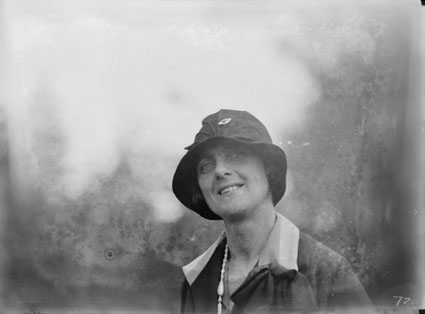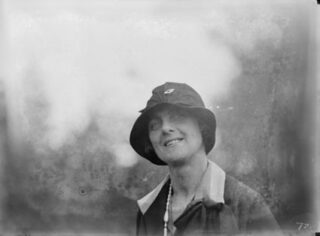- Entry type: Person
- Entry ID: AWE4867
Mildenhall, Adele Emma
(1894 – 1983)
- Occupation Charity worker, Community worker
Summary
Adele (Jill) Mildenhall arrived in Canberra during the settlement’s infancy. She quickly became involved in several charitable and religious organisations including St John the Baptist Church, the Young Women’s Christian Association (YWCA) and the Mothercraft Society. She was also a valued member of Canberra’s social scene as a tennis player and an entertainer.
Details
In January 1920 Adele (Jill) Mildenhall, her husband and 18-month-old daughter arrived in Canberra. The family had endured a lengthy train ride from Melbourne and then a four and a half-hour car ride from Yass. William James (Jack) Mildenhall, public servant and photographer, later recalled the family’s dismay when arriving at the gate to Upper Acton, then a small settlement of eight weatherboard dwellings. Informed by the driver that ‘this was Canberra’, he was ‘too dum[f]ounded to make further enquiries’.
The barrenness of Canberra was also a rude shock to Jill who was used to the inner-city suburban bustle and amenities of Melbourne. Jill’s father, Ernest Potter Knight, a local baker in the Melbourne suburb of Coburg had set a strong example as an active community member sitting on the Coburg Infant School Board of Advice and serving as treasurer of St Augustine’s Church, Moreland and the Coburg Progress Association. It was with a similar zeal that Jill became involved in the fledgling Canberra community.
Jill’s talent in singing and playing the piano was in much demand. In the early 1920s she performed regularly in a company known as the Smart Set Entertainers where her singing voice was described as ‘always pleasing’. The group attracted packed houses and helped to raise money for local causes including the Canberra Library and the Queanbeyan Soldiers’ Memorial Fund. Familiar with other talented residents, Jill often volunteered to organise entertainment or perform at events in which she had an interest, such as at the YWCA afternoon tea; the Tennis Dance at Acton; the annual Lodge St Andrew Masonic Dinner and Social; the Returned Sailors and Soldiers’ Imperial League Masquerade Ball; a concert for Telopea Park School piano; and the opening of the Causeway Hall.
For families living in cottages at Upper Acton, local get-togethers were crucial as, with little means of transport, Canberra was known as ‘The City of Dreadful Distances’. A favourite community event was tennis matches held at the Residency (then, the Federal Capital Advisory committee and Federal Capital Commission headquarters, later known as Canberra House). Jill was a keen tennis player and later played competitively with the Canberra Tennis Association. She was regularly noted playing in matches held across Canberra at Eastlake, Northbourne and Queanbeyan tennis clubs. In the late 1920s she was selected to play representative tennis at Country Week Tennis tournaments in Sydney.
Religious observance entailed considerable endurance in Jill’s early years in Canberra. A member of the Church of England congregation of St John the Baptist Church, she walked 35 to 40 minutes across a paddock to attend Sunday services. She became a member of the choir and was active in the St John’s Churchwomen’s Guild (established 1928). In October 1929 Jill organised a Tennis Tournament as part of a successful American Tea held at Canberra House. The event raised over £22 for the church restoration fund.
Jill was also involved in the early years of a number of Canberra charitable welfare organisations. In October 1926 she was elected to the provisional committee establishing the Ainslie Child Welfare Clinic and then in December to the newly formed committee for the Acton branch of the Women and Children’s Welfare Society. From 1934 to 1937 Jill served on the Board of Directors of the Canberra branch of the YWCA. During her first year on the board, she was one of a small team of delegates selected to attend the National YWCA convention in Melbourne. After her return she reported back to the Canberra branch on the inspirational significance of the convention. Next year she headed the membership committee and introduced a new card system. In 1939 she became a new member of the Canberra Community Hospital Auxiliary.
In March 1942 Jack was transferred to the Department of Munitions in Melbourne for the duration of the war. Although Melbourne-born, it seems that after 20 years’ residency, Canberra had become Jill’s much-missed home. In 1943 it was noted in the Canberra Times that Mrs Mildenhall ‘sent remembrances to Canberra friends’ and by late 1945 the couple returned to Canberra where Jack resumed his position as Registrar of Motor Vehicles.
In later years Jill assisted her husband as he was appointed to increasingly prominent positions in Canberra charities; as Chairman of the ACT division of the Australian Red Cross Society (1948-50, 1952-6) and inaugural Chairman of the Good Neighbour Council of the ACT (1950). She also developed an interest in religious instruction and she was said to have taught scripture at Canberra Church of England Girls Grammar in the early years of World War II and then at Forrest Primary School from 1959 to 1972.
Archival resources
Digital resources
Published resources
- Book
- Newsletter
-
Resource
- Trove: Mildenhall, Adele Emma (1894-19830225), http://nla.gov.au/nla.party-1666014
-
Site Exhibition
- From Lady Denman to Katy Gallagher: A Century of Women's Contributions to Canberra, Australian Women's Archives Project, 2013, http://www.womenaustralia.info/exhib/ldkg
